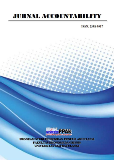PENGARUH SIKAP WAJIB PAJAK PADA PELAKSANAAN SANKSI DENDA, PELAYANAN FISKUS DAN KESADARAN PERPAJAKAN TERHADAP KEPATUHAN WAJIB PAJAK (STUDI EMPIRIS TERHADAP WAJIB PAJAK RESTORAN ORANG PRIBADI DI KOTA MANADO DAN DI KABUPATEN MINAHASA)
Abstract
Taxes are the largest revenue source in addition to oil and gas. In the era of Indonesia's tax reform, the tax collection system is set to a self-assessment system, which gives full trust to the taxpayer to calculate, pay, and report all taxes that become his obligations. One of the obstacles that may hinder the effectiveness of tax collection is tax compliance. This is happened in every region in Indonesia, including in the Manado City and Minahasa District, which has a decrease tendency of tax compliance since 2010 until 2014 based on the data from the Dinas Pendapatan Daerah Kota Manado (Local Revenue Office of Manado City) and Dinas Pendapatan Daerah Kabupaten Minahasa (Local Revenue Office of Minahasa District). As tax authorities, these offices tried to uphold the norms of taxation by applying administrative sanctions such as fines for taxpayers who are late paying taxes in accordance with the district’s legislation, but it has not been able to increase tax compliance in paying taxes. Therefore, this study is aimed to analyze the influence of the attitude of the taxpayer on the implementation of financial penalties on tax compliance, the service tax authorities on tax compliance, and tax awareness on tax compliance. By using qualitative research methods with multiple linear regression, this study concluded that the attitude of taxpayer on the implementation of financial penalties affect tax compliance, service tax authorities did not affect tax compliance, and awareness of tax affect tax compliance.
Keywords : Tax Compliance, Tax Authorities, Tax Awareness.
Downloads
Published
Issue
Section
License
The articles published in Jurnal Accountability are licensed under Creative Commons Attribution-NonCommercial 4.0 International with authors as copyright holders.
Â

This work is licensed under a Creative Commons Attribution-NonCommercial 4.0 International License.
Â
- Share — copy and redistribute the material in any medium or format.
- Adapt — remix, transform, and build upon the material.
- The licensor cannot revoke these freedoms as long as you follow the license terms.
- Attribution — You must give appropriate credit, provide a link to the license, and indicate if changes were made. You may do so in any reasonable manner, but not in any way that suggests the licensor endorses you or your use.
- NonCommercial — You may not use the material for commercial purposes.
- No additional restrictions — You may not apply legal terms or technological measures that legally restrict others from doing anything the license permits.
- You do not have to comply with the license for elements of the material in the public domain or where your use is permitted by an applicable exception or limitation.
- No warranties are given. The license may not give you all of the permissions necessary for your intended use. For example, other rights such as publicity, privacy, or moral rights may limit how you use the material.


